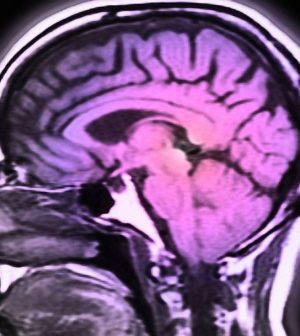- The Best Time of Day to Drink Bone Broth to Maximize Health Benefits
- 8 Ways to Increase Dopamine Naturally
- 7 Best Breads for Maintaining Stable Blood Sugar
- Gelatin vs. Collagen: Which is Best for Skin, Nails, and Joints?
- The Long-Term Effects of Daily Turmeric Supplements on Liver Health
- Could Your Grocery Store Meat Be Causing Recurring UTIs?
- Are You Making This Expensive Thermostat Error This Winter?
- Recognizing the Signs of Hypothyroidism
- 10 Strategies to Overcome Insomnia
- Could Artificial Sweeteners Be Aging the Brain Faster?
Major Gene Study Looks at Origins of Bipolar Disorder

Scientists report they have pinpointed 64 regions in the DNA of humans that increase a person’s risk of bipolar disorder, more than twice the number previously identified.
The researchers, who called this the largest investigation of bipolar disorder to date, also discovered overlap in the genetic roots of bipolar disorder and other psychiatric disorders. They said it adds to evidence that sleep habits, alcohol and substance use may play a role in the development of bipolar disorder, which affects 40 million to 50 million people worldwide.
People with the disorder — which typically begins in young adulthood — have recurrent episodes of severely high and low moods and have an increased risk of suicide.
In this study, an international team of researchers within the Psychiatric Genomics Consortium scanned more than 7.5 million common variations in the DNA sequence of nearly 415,000 people, including more than 40,000 with bipolar disorder.
“It is well established that bipolar disorder has a substantial genetic basis and identifying DNA variations that increase risk can yield insights into the condition’s underlying biology,” said study author Niamh Mullins, an assistant professor of psychiatric genomics at the Icahn School of Medicine at Mount Sinai in New York City.
“Our study found DNA variations involved in brain cell communication and calcium signaling that increase risk of bipolar disorder,” she said in a Mount Sinai news release. “The findings suggest that drugs, such as calcium channel blockers that are already used for the treatment of high blood pressure and other conditions of the circulatory system, could be investigated as potential treatments for bipolar disorder, yet it’s important to note that future research to directly assess whether these medications are effective is essential.”
The researchers also found genetic similarities between bipolar I disorder and schizophrenia, and between bipolar II disorder and major depression, according to the study published May 17 in the journal Nature Genetics.
“Through this work, we prioritized some specific genes and DNA variations which can now be followed up in laboratory experiments to better understand the biological mechanisms through which they act to increase risk of bipolar disorder,” said senior study author Dr. Ole Andreassen, a professor of psychiatry at the Institute of Clinical Medicine and Oslo University Hospital in Norway.
A better understanding of the causes of bipolar disorder could lead to new and better treatments, the researchers said, and improve prevention or management of the illness.
More information
The U.S. National Institute of Mental Health has more on bipolar disorder.
SOURCE: Mount Sinai Health System, news release, May 17, 2021
Source: HealthDay
Copyright © 2026 HealthDay. All rights reserved.










